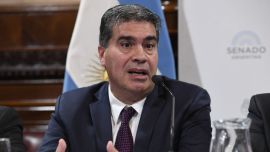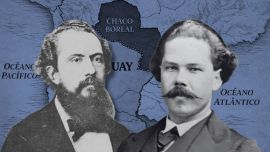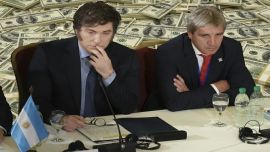Javier Milei gave his first speech as president-elect in a setting emulating the look of the White House press office – a clear symbol of the change in direction that is to come for Argentina's foreign policy.
A new approach to international relations is one of the radical changes the newly elected head of state has promised to implement during his administration. In the meantime, the La Libertad Avanza leader's challenge will be to move cautiously on the international scene, putting statements that altered diplomatic channels with Argentina’s major partners – such as a potential break in relationships with China and Brazil – behind him.
"Our geopolitical alignment is with the United States and Israel. That’s our international policy. We won’t align with communists,” Milei had anticipated after his landslide victory in the August 13 PASO primaries.
His statements came shortly after it was announced that Argentina would be joining the BRICS group of nations, clubbing together with other countries such as Iran – a fact which looks somewhat unwise after the massacre of Israeli citizens by Hamas on October 7.
At one point in the campaign, Milei accused China of being “assassins." Beijing has for now limited itself to “inviting” the then presidential candidate to visit the country.
Figures within the libertarian leader's circle have started toning down their statements, especially regarding China, a country with which Argentina has current direct investment projects in addition to the US$19 billion committed in the recent currency swap extension.
Mondino clarifies stance
Among those seeking to calm the waters is Diana Mondino, the economist who was in charge of broadcasting libertarian foreign policy talking-points during the campaign. “Milei has been misinterpreted multiple times,” pointed out the president’s likely foreign minister in an interview.
In that vein, she clarified that Milei’s position is that “all trade will go on,” but that relations will be established by “the private sector” first and foremost. “There is no way that trade with China or Brazil will be stopped,” stated Mondino, adding that the change will be “no more secret contracts” between governments “of the kind we have now.”
Another core theme will be a Brazil ruled by a government that not only is the complete antithesis of Milei’s ideas, but also took an active part in supporting the campaign of his competitor, Economy Minister Sergio Massa.
Putting ideological aspects aside, including Milei’s friendship with the former Brazilian president Jair Bolsonaro and his clan, the challenge will be the future of Mercosur trade bloc, currently deadlocked on proposals over the rules on members signing free-trade agreements with other states.
“What has ended up happening is a deviation of trade,” Mondino said about the regional bloc in a recent interview, referring to negotiations with the European Union over a long-delayed free-trade deal.
Keeping on the theme, a significant detail is that the first head of state to call Milei and congratulate him was Uruguayan Luis Lacalle Pou – the same leader who has rocked the bloc by attempting to negotiate external treaties. “We have a very good relationship,” said Milei about that talk.
Milei's position about Russia, in the meantime, remains an enigma. Regardless of his condemnation of the invasion of Ukraine, Milei has still not defined the bilateral relations with the country governed by Vladimir Putin, a historic ally of Kirchnerism. Even though the Russian president congratulated Milei and wished him “success” in an official release, they remain cautious at the Kremlin.
“We took note of a series of statements that Mr Milei made during the electoral campaign, but we will focus on and judge him mainly for the statements he makes after his inauguration,” Kremlin Spokesperson Dimitri Peskov said after the electoral result became known.
Regional foes
An unclear stance is Milei's position on authoritarian governments in Venezuela, Cuba and Nicaragua, although based on the candidate's rhetoric, everything suggests that he will take an ambivalent position as Alberto Fernández’s administration has done for votes at multilateral organisations on such topics as human rights.
The only certainty is Argentina's coming strategic alignment with the United States and Israel, a fact so evident that Milei himself announced that he would travel to both countries prior to the presidential inauguration.
This alignment will be echoed in other areas, such as the economy (given negotiations with creditors for the foreign debt and new sources of financing) and defence (within the context of purchases to modernise the Armed Forces made by the outgoing government of Alberto Fernández).
As for Malvinas (Falkland) Islands, which Argentina's claims as its own, the libertarian government will aim at a “fraternal relationship” with the United Kingdom but will adhere to the Constitution.
In addition, Mondino anticipated that the “islanders’ wishes” will not be taken into account in potential negotiations with the United Kingdom, but since “they are Argentines” they must have “equality before the law," she added.
The grand idea of La Libertad Avanza is to open up the “protected” Argentine economy to trade, so that the private sector can compete in the big leagues with no hindrance. This entails eliminating the SIRA, the system implemented by the government for imports.
According to the vision of the new government, “the people believe it is a problem of foreign currency, but it is the government that decides who can import and what can be imported."
A lot of change lies ahead.
“The trading relationship of any private party or company will continue with the total freedom they have now and they will continue to have. On the contrary, they will have a lot more freedom because they won’t have the current interference by the middleman”, Mondino explained in the run-up to the general election.




















Comments